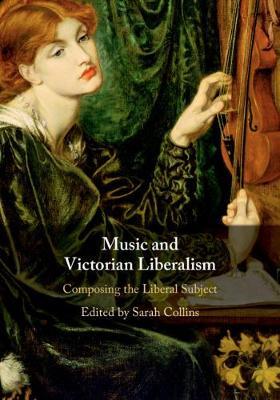Overview
The discourse of Victorian liberalism has long been explored by scholars of literature, with reference to politics, ethics and aesthetics. Yet little attention has been paid to music's role in the context of these debates, leaving a rich collection of historical and archival detail on the periphery of our understanding. From the impact of the National Sunday League to the reception of Wagner in London, this collection of essays aims to nuance current approaches to the aesthetic facets of liberalism, examining the interaction between music and liberal ideas in a variety of social contexts. The significance of music for modern conceptions of self-hood and community is uncovered, revealing a new dimension of Victorian liberalism.
Full Product Details
Author: Sarah Collins (University of Western Australia, Perth)
Publisher: Cambridge University Press
Imprint: Cambridge University Press
Dimensions:
Width: 18.00cm
, Height: 1.60cm
, Length: 25.30cm
Weight: 0.710kg
ISBN: 9781108480055
ISBN 10: 1108480055
Pages: 266
Publication Date: 06 June 2019
Audience:
Professional and scholarly
,
Professional & Vocational
Format: Hardback
Publisher's Status: Active
Availability: Available To Order

We have confirmation that this item is in stock with the supplier. It will be ordered in for you and dispatched immediately.
Reviews
'This book is a most welcome contribution to the renewed interest in liberalism and music culture. It reveals that Victorian liberal values were shaped by aesthetic debates in which the acts of performing and listening to music played an important role. The essays offer an absorbing illustration of the various tensions between music as recreation and music as a means of control, examining the role of human agency and the endeavour to experience life as an individual liberal subject.' Derek B. Scott, University of Leeds `This book is a most welcome contribution to the renewed interest in liberalism and music culture. It reveals that Victorian liberal values were shaped by aesthetic debates in which the acts of performing and listening to music played an important role. The essays offer an absorbing illustration of the various tensions between music as recreation and music as a means of control, examining the role of human agency and the endeavour to experience life as an individual liberal subject.' Derek B. Scott, University of Leeds
'This book is a most welcome contribution to the renewed interest in liberalism and music culture. It reveals that Victorian liberal values were shaped by aesthetic debates in which the acts of performing and listening to music played an important role. The essays offer an absorbing illustration of the various tensions between music as recreation and music as a means of control, examining the role of human agency and the endeavour to experience life as an individual liberal subject.' Derek B. Scott, University of Leeds 'This book is a most welcome contribution to the renewed interest in liberalism and music culture. It reveals that Victorian liberal values were shaped by aesthetic debates in which the acts of performing and listening to music played an important role. The essays offer an absorbing illustration of the various tensions between music as recreation and music as a means of control, examining the role of human agency and the endeavour to experience life as an individual liberal subject.' Derek B. Scott, University of Leeds
Advance praise: 'This book is a most welcome contribution to the renewed interest in liberalism and music culture. It reveals that Victorian liberal values were shaped by aesthetic debates in which the acts of performing and listening to music played an important role. The essays offer an absorbing illustration of the various tensions between music as recreation and music as a means of control, examining the role of human agency and the endeavour to experience life as an individual liberal subject.' Derek B. Scott, University of Leeds `This book is a most welcome contribution to the renewed interest in liberalism and music culture. It reveals that Victorian liberal values were shaped by aesthetic debates in which the acts of performing and listening to music played an important role. The essays offer an absorbing illustration of the various tensions between music as recreation and music as a means of control, examining the role of human agency and the endeavour to experience life as an individual liberal subject.' Derek B. Scott, University of Leeds
Advance praise: 'This book is a most welcome contribution to the renewed interest in liberalism and music culture. It reveals that Victorian liberal values were shaped by aesthetic debates in which the acts of performing and listening to music played an important role. The essays offer an absorbing illustration of the various tensions between music as recreation and music as a means of control, examining the role of human agency and the endeavour to experience life as an individual liberal subject.' Derek B. Scott, University of Leeds
Author Information
Sarah Collins is a Senior Lecturer in musicology at the University of Western Australia. In 2017, she was a Visiting Fellow at Harvard University and a Marie Skłodowska-Curie Research Fellow at Durham University. Collins is the author of Lateness and Modernism (Cambridge, forthcoming) and The Aesthetic Life of Cyril Scott (2013). Her work has appeared in journals including the Journal of the Royal Musical Association, Twentieth-Century Music, Music & Letters and Musical Quarterly.




